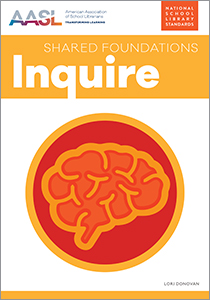An interview with Lori E. Donovan about effective implementation of AASL's Shared Foundation Inquire
The K-12 Library Services Specialist for Chesterfield County Public Schools in Virginia as well as an active author, Lori E. Donovan was the perfect person to explore the nitty gritty of effective implementation of the Shared Foundation Inquire from the National School Library Standards. Her new book Inquire is loaded with ideas and strategies to grow critical, systematic thinkers who design solutions to authentic problems. In this interview she talks about her involvement with the project and how school librarians can keep children's natural curiosity focused on learning.
 Congrats on the book! Tell us a little bit about how you came to be involved with the project.
Congrats on the book! Tell us a little bit about how you came to be involved with the project.
I was honored to be asked to write this Shared Foundation book. Inquiry has always been a foundation in my life; my parents encouraged me to be curious and ask questions, and I, in turn, asked my learners to do the same. Stephanie Book, staff member at AASL, approached me about writing this book for the series. She had gotten to know me from another project I did with AASL, and I had shared with her my proposal for an AASL Conference (2017) session on the Question Formulation Technique and Inquiry in the School Library, so she knew that I had a passion for inquiry learning. Books and learning have always been a part of my life. I enjoyed playing school when little, reading mysteries, watching shows and movies where I had to figure out “who done it." I never realized how much of a role inquiry and inquiry-based learning had on my life until I was asked to write about this topic for this book. I think that's what ultimately led me to becoming an educator; first in the classroom as an English and Drama teacher and then as a school librarian.
What was your approach for finding all the K-12 school librarian contributors?
I wanted this book to reflect all school libraries — no matter the level, urban, rural, suburban, as well as the level of expertise of the school librarian. I started with my own state and reached out on our list-serv with a survey asking school librarians to share lessons that could demonstrate the Competencies of the Inquire learner framework. I also reached out on the AASL Forum, and the Supervisors section on ALA Connect to solicit for lesson plans. I am so happy with the school librarians who were willing to share their lessons with other library professionals. My hope is that school librarians who read this book will be able to replicate, reuse, remix, and/or refine the information within for developing their own learning opportunities for their specific learners.
Can you offer a few tips for keeping children’s natural curiosity activated even if their attention starts to wander?
I think it is very important for school librarians and their educator partners to get to know their learners well and always keep them first when planning collaborative units. Survey and interview learners beforehand to find out what they are interested in and where their talents lie to engage them in the learning process. Look for different entry modes to the inquiry unit to provide voice and choice for learners to direct their own learning through the process; this might be hard to let go and become a facilitator, but we want to create learners who can transfer skills and knowledge to new learnings and opportunities for other inquiry. Work to create small units of work within the inquiry unit so that learners don’t become overwhelmed, and for learners who struggle with their learning can find some success that will keep them moving forward.
What are some ways that busy school librarians and educators can integrate reflection into their daily schedule?
 Time has become such a four letter word in today’s fast-paced society that reflection sometimes gets lost. But, school librarians and their educator partners do reflect often during the lesson to make adjustments to what they see happening at the time of the lesson. Asking learners to reflect through an exit ticket can help school librarians and their educator partners formatively assess the lesson and look at who is ready to move on to the next thing and those learners who need some reinforcement before moving on to the next thing. All the inquiry processes and tools listed in the book stress the importance of reflecting on both the process and the product. Taking the time to slow down and reflect along the way as well as at the end can make the inquiry project, and the next one, that much stronger.
Time has become such a four letter word in today’s fast-paced society that reflection sometimes gets lost. But, school librarians and their educator partners do reflect often during the lesson to make adjustments to what they see happening at the time of the lesson. Asking learners to reflect through an exit ticket can help school librarians and their educator partners formatively assess the lesson and look at who is ready to move on to the next thing and those learners who need some reinforcement before moving on to the next thing. All the inquiry processes and tools listed in the book stress the importance of reflecting on both the process and the product. Taking the time to slow down and reflect along the way as well as at the end can make the inquiry project, and the next one, that much stronger.
When you were at the AASL Conference earlier this year, did you meet any fans of your book? Were there comments or compliments that have really stuck with you?
I did have quite a few folks at the book talk, so I was excited that people were interested in this book and how to incorporate ideas from the book into their own practice. A couple of people have said that they like that it is structured through the Domains and reflects the learner, school librarian, and school librarian Competencies and Alignments. I placed a copy in my school division’s central library professional collection. One of my librarians sent me an email stating: “Congratulations on your new book! I have been reading it this week and I just ordered it on Mackin. It has some great strategies and ideas that I can use in the library.Thanks for sharing.” One of my lesson plan contributors put on Facebook, “Thank you so much Lori for including me in your book. Such a great experience.”
Learn more at the ALA Store.
